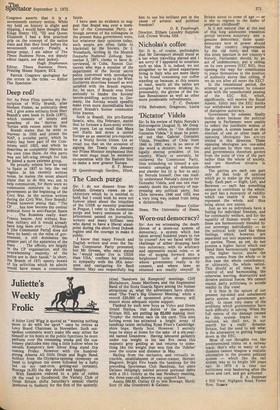Worn-out democracy?
Sir: Are we witnessing the death throes of a worn-out system of democracy, a system which has taken several hundred years to run its course? Are we faced with the challenge of either dropping back into autocracy, with its arbitrary and oppressive social rules — or else of surging forward into a heightened form of democracy where government really is by consent, and where laws so obtained are readily obeyed? Is
Britain about to come of age — or is she to regress to the limbo of perpetual childhood?
Is it not natural that at the end of this long adolescent transition period between autocracy and a genuine democracy, those quasidemocrats now in power should find the country ungovernable by the old rules; and that at this crisis juncture in our country's history, Parliament should, by an act of undemocracy, put a ceiling on its own powers (EEC Bill), thus opening the way for constituents to place themselves in the position of authority above that ceiling, if we do not after all enter the EEC?
In the transitional period, the attempt at government by consent ends with the unauthorised passing of the EEC Bill, which, significantly, will receive the Royal Assent. Entry into the EEC marks our withdrawal into a new period of disruptive autocracy.
Government by consent finally broke down because the political parties in Parliament were unable to reflect the justifiable wishes of the people. A system based on the election of one or other team of opposing ideologists has always tended in this direction. These opposing ideologies are one-sided and partisan by their very nature, and governments therefore govern from the point of view of the part rather than the whole of society, and are therefore divisive in character.
The parties are each one part only of that body of opinions which go to make up the political body. Each part — Right, Left, and Between — each has something unique to contribute to the whole; no part has a monopoly of validity which can enable it alone to represent the whole, and thus bring about one nation. Just as we as individuals have a feeling for individual freedom, and for community welfare, and for the equality of human worth — and these are harmoniously blended by our sovereign individuality — so the political body itself has these feelings, which, however, are separated out into separate entities or parties. These, as yet, do not possess a higher factor which can blend them harmoniously together.
The higher factor, above the parts, comes from the whole — in this case the whole constituency, or ultimately, the whole nation. This should at all times be in control of, and harmonising, the otherwise warring, destructive and divisive political forces. We cannot expect party politicians to accede readily to this view! It is thus in the nature of our
present lop-sided and unbalanced party system of government actually to cause very many of the problems which governments have such difficulty in solving. When the full extent of the damage caused by this system begins to be realised, we shall not, in our search for a really dynamic Britain, feel the need to ask what is the alternative to getting bogged down in the EEC.
Most of our thoughts run like predetermined trains on a railway track; that's why so many of our thinkers cannot imagine a realistic alternative to the present political system — which like the rail system was at its height 100 years ago. In 1973 it is time our politicians stop hankering after the horse and cart, and get airborne!
R. A. Boatman 4 Hill View, Highgate Road, Forest Row, Sussex






































 Previous page
Previous page